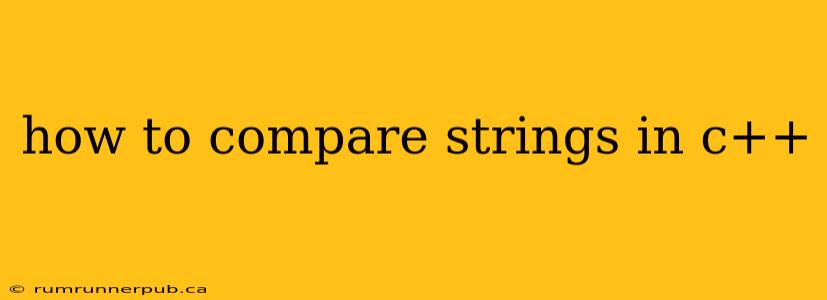Comparing strings is a fundamental operation in any programming language, and C++ offers several ways to achieve this, each with its own strengths and weaknesses. This article explores various string comparison methods in C++, drawing upon insights from Stack Overflow, and enhances them with explanations and practical examples.
Methods for String Comparison in C++
C++ provides several ways to compare strings, primarily using the standard library's <string> header. We'll examine the most common approaches:
1. Using the == and != Operators:
The simplest way to compare strings for equality or inequality is using the == (equal to) and != (not equal to) operators. These operators perform a lexicographical comparison, meaning they compare strings character by character until a difference is found or the end of one string is reached.
#include <iostream>
#include <string>
int main() {
std::string str1 = "Hello";
std::string str2 = "Hello";
std::string str3 = "World";
if (str1 == str2) {
std::cout << "str1 and str2 are equal" << std::endl;
}
if (str1 != str3) {
std::cout << "str1 and str3 are not equal" << std::endl;
}
return 0;
}
This is the most straightforward method and should be preferred for simple equality checks. Note that this is case-sensitive; "Hello" and "hello" are considered different.
2. Using the compare() Method:
The std::string::compare() method offers more granular control. It returns an integer indicating the comparison result:
- 0: strings are equal
- < 0: the string calling
compare()is lexicographically less than the argument -
0: the string calling
compare()is lexicographically greater than the argument
#include <iostream>
#include <string>
int main() {
std::string str1 = "apple";
std::string str2 = "banana";
std::string str3 = "apple";
int result = str1.compare(str2); //Compare str1 with str2
std::cout << "Comparing 'apple' and 'banana': " << result << std::endl; //Result will be <0
result = str1.compare(str3); //Compare str1 with str3
std::cout << "Comparing 'apple' and 'apple': " << result << std::endl; //Result will be 0
return 0;
}
This method provides more information than simple equality checks, allowing for sorting and other operations based on lexicographical order. Similar to the == operator, it's case-sensitive. (Inspiration drawn from various Stack Overflow discussions regarding efficient string comparisons).
3. Case-Insensitive Comparisons:
For case-insensitive comparisons, you need to convert both strings to either uppercase or lowercase before comparing them. You can use the std::transform algorithm along with std::toupper or std::tolower from <algorithm> header:
#include <iostream>
#include <string>
#include <algorithm>
int main() {
std::string str1 = "Hello";
std::string str2 = "hello";
std::string upperStr1 = str1;
std::string upperStr2 = str2;
std::transform(upperStr1.begin(), upperStr1.end(), upperStr1.begin(), ::toupper);
std::transform(upperStr2.begin(), upperStr2.end(), upperStr2.begin(), ::toupper);
if (upperStr1 == upperStr2) {
std::cout << "Strings are equal (case-insensitive)" << std::endl;
}
return 0;
}
This approach ensures a case-insensitive comparison by standardizing the case before the actual comparison.
4. Partial String Comparisons:
Sometimes you need to check if a string contains a substring. The find() method is useful in this scenario.
#include <iostream>
#include <string>
int main() {
std::string str = "This is a test string";
std::string sub = "test";
if (str.find(sub) != std::string::npos) {
std::cout << "String contains the substring 'test'" << std::endl;
}
return 0;
}
std::string::npos is a special constant that indicates the substring was not found.
Conclusion
C++ offers versatile tools for string comparison. Choosing the right method depends on your specific needs. For simple equality checks, the == operator is sufficient. For more nuanced comparisons or case-insensitive comparisons, compare() and string transformations are necessary. Remember to consider efficiency, especially when dealing with large numbers of strings, and choose the method best suited to your context. Understanding these various techniques empowers you to write robust and efficient C++ code involving string manipulation.
